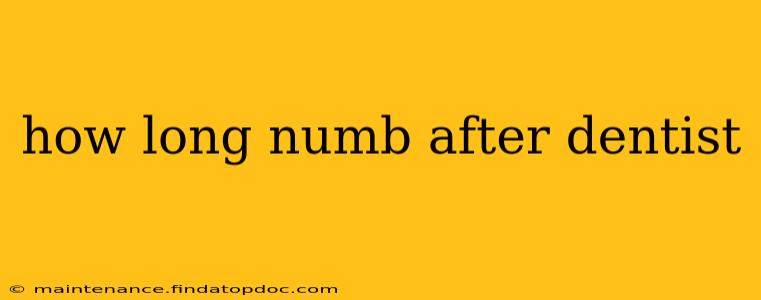Feeling numb after a dental visit is perfectly normal. Dental professionals use local anesthetics to ensure your comfort during procedures. However, the duration of this numbness varies depending on several factors. This comprehensive guide will explore the typical timeframe, influencing factors, and what to expect during your recovery.
How Long Does the Numbness Typically Last?
The most common answer is between 2 and 12 hours. Most patients report that the numbness significantly subsides within 4-6 hours. However, for some, the effects can linger for up to 12 hours or, in rare cases, even a little longer. The type of procedure, the amount of anesthetic used, and individual factors all play a crucial role in determining the exact duration.
What Factors Influence the Duration of Numbness?
Several factors influence how long the numbness lasts after a dental procedure:
- Type of Anesthetic: Different anesthetics have different durations of action. Some are formulated to provide shorter-term numbness, while others offer longer-lasting effects. Your dentist chooses the most appropriate anesthetic based on the specific procedure.
- Amount of Anesthetic Used: The quantity of anesthetic injected directly correlates with the duration of numbness. More anesthetic generally means longer-lasting effects.
- Injection Site: The location of the injection can also impact the duration. Numbness in areas with a richer blood supply might dissipate more quickly.
- Individual Metabolism: How quickly your body processes the anesthetic significantly affects the duration of numbness. Metabolic rates vary from person to person.
- Type of Procedure: More extensive procedures often require a larger amount of anesthetic, leading to longer-lasting numbness. A simple filling will likely result in shorter numbness than a tooth extraction.
What if the numbness lasts longer than 12 hours?
While most numbness subsides within 12 hours, if it persists significantly longer, it's crucial to contact your dentist. Prolonged numbness could indicate a problem that requires attention. Don't hesitate to seek professional advice if you have concerns.
What if I'm still numb the next day?
Persistent numbness beyond 24 hours warrants a call to your dentist. While rare, this could indicate a complication requiring medical attention.
Can I drive after a dental procedure with local anesthetic?
This depends entirely on the level of numbness and your individual response to the anesthetic. If you are still experiencing significant numbness, do not drive. Impaired coordination and reduced sensation can be dangerous behind the wheel. It's always best to err on the side of caution and arrange alternative transportation. Check with your dentist for specific guidance based on your circumstances.
What can I do to manage discomfort or potential injury while numb?
While numb, you're less likely to notice pain, but you are at risk of biting your lip or cheek accidentally. Avoid eating or drinking hot liquids, and stick to soft foods until your feeling returns. Remember to avoid chewing until feeling returns completely. Using a soft-bristled toothbrush for gentle cleaning is advisable.
Are there any risks associated with prolonged numbness?
Prolonged numbness is usually not a cause for major concern, but persistent or unusual numbness could indicate a more serious issue. This is why contacting your dentist is crucial if the numbness persists.
By understanding the factors influencing the duration of numbness and taking appropriate precautions, you can ensure a comfortable and safe recovery after your dental procedure. Remember to always communicate with your dentist about any concerns you might have.
